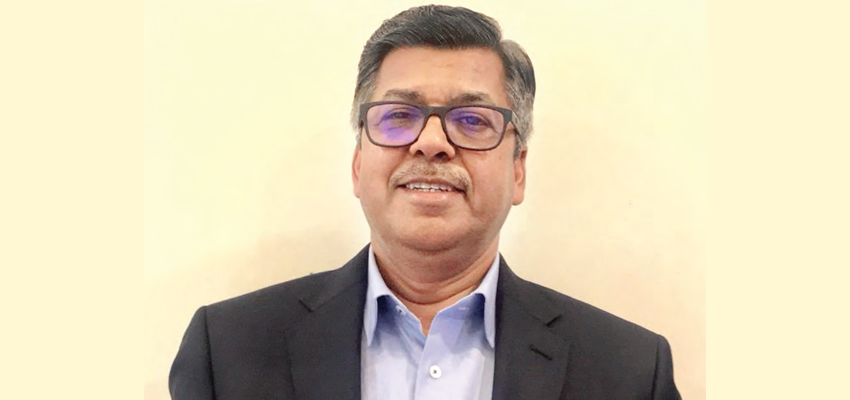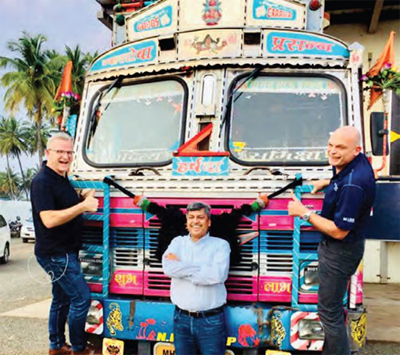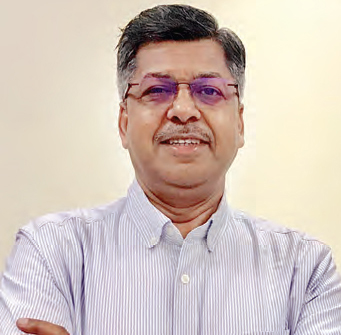From Building to Guiding

Foodpreneur Ravi Nigam has worn several hats in the course of an illustrious and long-lived career. With vast experience in running food and agri businesses globally, Ravi believes that it is the one sector that can uplift rural lives across the country. An alumnus of the Harvard Business School and the Institute of Rural Management in Anand, Ravi has been instrumental in co-founding Tasty Bite Eatables Ltd in 1997, the Number 1 Indian consumer food brand in North America with a presence in over 60 leading retail chains and 20,000+ supermarket stores. The ‘Great Places to Work with’ Institute has ranked Tasty Bite as amongst the top 50 places to work with in India for over a decade since 2009. In a landmark transaction, Tasty Bite was acquired by Mars Inc. an international food giant in 2015.
Currently, the President of TiE Pune, he is a mentor to start-ups, angel investor and an independent board member in several companies. “I thrive on the buzz of shaping raw talent to reach its maximum potential,” he says. Over to the entrepreneur turned mentor who actually bought a company from Unilever.
"I realized I could impact rural livelihoods even by joining the private sector; I didn’t have to be part of the cooperative sector for that"
- Ravi Nigam
Corporate Citizen: Sir, do tell us about your childhood and early education. What was it that led you to join the corporate world in the rural sector at that?
Ravi Nigam: With a father in the Indian Airforce, my childhood days were spent travelling to different parts of the country every 2 to 3 years. From Mysore in the South to Shillong in the North-East to Jodhpur in the West, I saw the length and breadth of the country. After doing my Chemistry honors from Bijapur University in Karnataka, I immediately thought of doing an MBA. Though I didn’t know much of the corporate world, in my mind, this was a degree that would widen the scope of my world. In those days, just about 18 colleges in India offered an MBA degree. I got busy writing exams and appearing for interviews. Just then, I came across information on the Institute of Rural management helmed by Dr. V Kurien, the father of the White Revolution, the social entrepreneur whose work and ideas made dairy farming India’s largest self-sustaining industry and the largest rural employment sector. If he had moved to some place as remote as Anand, Gujarat after all that he had achieved with Amul, there had to go be good reason. I wanted to be part of this too.
CC: So would you say it was youthful idealism that made you join?
Obviously, Dr Kurein was quite the inspirational hero to motivate a young person. He had the admiration and respect of hundreds of thousands of farmers-so to experience education at the IRMA, I thought would be something else entirely. It’s why I said no to joining the IIMs among other things. Sure enough, I learnt a lot about the needs of farmers and microbusinesses. And when those 2 years ended, as a logical conclusion, I was picked up by the National Dairy Development Board’s oil seeds wing and placed with the MP State Oil Federation in Bhopal to be part of the first-ever experiment on soyabean farming. This is where my idealism first hit the harsh ground of reality in the form of bureaucracy and politics. This was not what I had signed up for.
CC: So, what next?
Another opportunity soon arose. Britannia had just entered the world of Soyabean processing, and I joined as a commercial manager for the edible oil sector and went on to launch the hugely successful brand Vital in the Central and Eastern parts of the country. We consciously chose to stay away from the South and West due to preferences of palate. This is when I realized I could impact rural livelihoods even by joining the private sector; I didn’t have to be part of the cooperative sector for that. Thereafter, I joined Pepsi. And as you know, I would be a part of the food and agri world for the rest of my career. 10 years into my career, the entrepreneurial bug bit me. Being part of big companies, you were but one drop in an ocean. To make an impact, I would have to do something else.
So, in 1992, I quit Pepsi and went back to Bhopal from New Delhi. The idea was to offer consultancy to large companies engaged in agri and exports. Please do note, this was an exciting time. Led by its Finance Minister Manmohan Singh, India had just embraced Liberalization, so the possibilities were immense. However, this was also the time when large companies, be it Larsen and Toubro, Britannia or Unilever, did not focus on exports as a core program-and here was where I could change things by creating an exports wing for them. I met with early success offering consultancy to these companies. Soon I had a 40-member team working for me. This caught the attention of Bellarpur Industries stewarded by the iconic Mr. Thapar. It was 1995 and mergers and acquisitions were hardly a thing then, but nevertheless, we merged with BILT. We did great work for them, such as entering the cucumber and algae market and making an impact by becoming global leaders in spirulina production. (Spirulina is an algae, a super food with more food value than any other form of plant life.) However, one was soon to realize that working for an Indian company came with its own pulls and pressures even as various members of the family fought for greater control. Like it or not, senior management, including me, was caught up in the same. This wasn’t a very happy occurrence, but it’s just how things were.
"The most important thing that I look at when I back a start-up is the founder. In short, we invest in the founders. I believe that an outstanding idea with an average entrepreneur won’t have much longevity; however, an average idea with a brilliant entrepreneur at the helm will"
 Ravi Nigam with Directors from Mars Global
Ravi Nigam with Directors from Mars Global QA and Engineering
CC: Tell us how Tasty Bites came to be.
And then once again a new idea struck. As it happened, a bunch of my friends from my Pepsi days and I, would travel quite often to the US. We realized that there was a huge demand for ethnic Indian-and Asian food. Add to that another buzzword-organic. And another convenience. Research pointed to the fact the amount of time spent by a family on cooking meals in the kitchen had dropped from 60 minutes just two decades ago to 15 minutes. So, we asked ourselves: Using these 3 levers-ethnic Asian, organic and convenience-what could we do? That’s how the idea of Tasty Bites was born. We called it Preferred Brands (based in the US) with a sourcing unit with company called Tasty Bites India, and another two sourcing units in Thailand and Dubai, targeting the mainstream Americans abroad. My friends were already in the US so things became easier even as we set up a team of high-quality vendors and participated in food festivals across the US. I would make frequent trips from New Delhi, where I was based. We struck the right chord early on-as this was the time that the retail giants Trader Joes and Whole Foods were making waves across the US changing the way people looked at organic and whole food. We were on their shelves. From the outset, we knew that we would have to be canny and focused about promoting our products---especially since we did not enjoy the budgets of the giants. So, we put all our funds into enabling as many product tastings and testings as we possibly could. This was our numero uno way of promoting Tasty Bites.
CC: Do tell us the exciting bit about you owning a public limited company after having bought it from none other than Unilever?
Well, six months into the business, a strange thing happened. We got to know of it watching the news: the public company Tasty Bites which was owned by Ravi Ghai, also the chairman of Kwality Ice-cream was acuired by Unilever. At that time Unilever had launched a frozen dessert called Walls-please note, ice-cream was the domain of only small and cottage industries. So Ravi Ghai bundled Kwality-and the loss-making BIFR company Tasty Bites as a deal-to Unilever. Sitting in the US, it was pretty clear to us that Unilever had bought an ice-cream brand and not a Ready to Eat Food brand. And while we had done a lot of work-from packaging to manufacturing to financing and leveraging the products of Tasty Bites, we were not the owners. And now, Unilever was either going to shut down the company or convert into an ice-cream manufacturing operation. Hence, the options before us were to launch a new brand as it was early days yet, or we could make the brave attempt to go to India and buy the company.
In retrospect, I wonder as to where from we got the courage to actually pop over to Mumbai and Bengaluru and sit with the Unilever board-who pretty much consisted of the doyens of industry to make our bid. At the time, the food business was headed by none other R. Gopalakrishnan who went on to become executive director at Tata Sons. He thought to himself: What on earth is Unilever going to do with a loss-making outfit? I like the idea of young talent taking over and possibly turning things around and with that protecting the jobs of all the people who work for Tasty Bites. Besides, a Rs 2 crore business wasn’t that attractive to a Conglomerate like Unilever. He was our greatest champion, but how on earth were we going to find the money to buy it? None of us came from business homes and those were not the days of private equity or angel investors chasing business ideas. So they helped with the process.
Unilever helped us structure things. A private equity player called Commonwealth Development Corporation & Preferred Brands, our company signed a JV on the back of which a special vehicle called the Preferred Brand Food India Ltd would buy out the majority equity from Unilever. Those were the days of public tenders-so we ended up with 74 per cent of the business with the responsibility of running the manufacturing unit in India. As per the consensus amongst us, I moved from Delhi to Pune. Our company became a dual head-quartered company with HQs in Pune and Stamford, Connecticut, US. Operations in the Thailand and Dubai were shut down and moved to Pune. Over the next 21 years we went from strength to strength making organic, healthy, convenient ready to eat products that were sterilized sans preservatives and a had a long shelf life of 18 months.
CC: What according to you is the secret of a long-lasting brand?
To live long in the hearts of its customers, a brand has to first connect with them one hundred per cent. It’s never about what you can make and always about what the customer actually wants. When we launched the Tasty Bites range of products, we realized that the mainstream American public did not understand a lot of the nuances-much in the same way that an Indian walking into a pizza-pasta Italian joint in those days would not! For instance, how many know what a carbonara or arabiatta sauce is! Same way, if you were to serve an American food with pieces of garam masala in it-they would not think to just remove them-in the process setting their tongue on fire! We realized that the trick was to give them the ethnic Asian cuisine food they dreamed of in a manner that they were used to eating-And respect their palate while at it. Take for example, a dish like Palak Paneer. Typically, palak paneer is a puree of spinach with pieces of cottage cheese in it. But in the US, puree is akin to baby food! So what we did was to chop up the spinach instead-as they love the bite of the spinach.
Then again, take a dish like Aloo-Chhole. In India, the proportion of chickpeas would be greater than the potatoes. But the US loves potatoes-so the proportion of both ingredients are reversed. Then again, there is Dal Makhni-a festive dish in India-which the Hispanic populace of the US would love. Imagine a Tacos or Burrito with dal makhni instead of beans topped with sour curd-they would just love it! So Tasty Bites caught on to these nuances very early and served them a range of food items that was ethnic Asian in origin but consumed in the manner our audience was accustomed to! So, attention to detail and market research go a long way in consolidating your brand.
"To live long in the hearts of its customers, a brand has to first connect with them one hundred per cent. It’s never about what you can make and always about what the customer actually wants"

CC: Could you tell us something about your family?
Well, my family consists of my wife Ruby, son Ashish and his bride. Ruby and I married 35 years ago and she has been my backbone ever since. A schoolteacher by profession, she has never questioned my need to experiment, take risks, leave high paying jobs with MNCs and venture into the unknown. Please do note, ours was not the world of venture capitalists so finding money to fund an entrepreneurial dream was far from easy. Others have questioned the wisdom of my decisions to put myself in the line of fire, never her. She’s been an awesome support. Our son Ashish has chosen green energy as his career and dream. And though he was away from India and Pune for quite some time, he returned in the early days of Covid and has been here since then. He recently got married and his wife is interested in food as well-though cakes and pastries are her passion.
CC: Apart from work, what are the passions that drive you?
Well, I love teaching and mentoring for one. When Tasty Bites was taken over by Mars in 2015, I stayed on till 2018 as part of the decision. Post this, though, I consciously chose not to start a new venture and help others create their dream instead. As president Tie, Pune, mentoring start-ups is at the very core of what we do. The sheer joy of working with youngsters is hard to beat. It’s just amazing to see these bright kids from ordinary homes come with bright ideas and the zeal to succeed-I love being part of their journey. It’s so exciting and rewarding. Had I not been an entrepreneur, I would easily have been a teacher. Apart from this, I am a voracious reader. I devour everything from fiction to non-fiction to management.
CC: What is it that motivates you to back a start-up? Is it a great idea or do you absolutely need to have a plan that is market ready?
Well, an idea and a plan are certainly important. Are the fundamentals in place? Is the narrative right? So on and so forth. However, the most important thing that I look at when I back a start-up is the founder. In short, we invest in the founders. Do they have the zest and energy, determination and resilience to see things through? These are hugely important qualities because entrepreneurs have to live on the edge of death for years on end before things begin to live up. So obviously endurance is a vital life-skill. That said, I believe that an outstanding idea with an average entrepreneur won’t have much longevity; however, an average idea with a brilliant entrepreneur at the helm will! That’s how important the founder is to the scheme of things!
CC: Lastly, what is the philosophy of life that you live and work by?
To give back. Having started out in times when where scaling up wasn’t so easy, if I can help talent achieve its true potential and help a business succeed faster than it would have, it would make me very happy indeed.